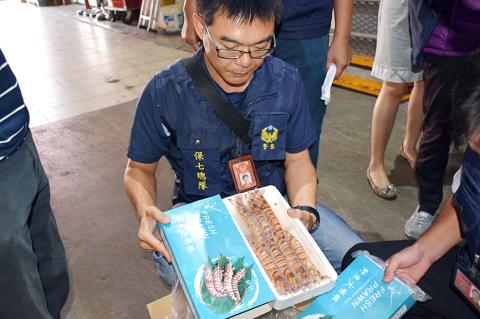The owners of a Kaohsiung-based seafood company were yesterday accused of making NT$700 million (US$21.83 million) in the past three years by selling expired seafood to restaurants and traditional markets in central and southern Taiwan, police said.
The Kaohsiung District Prosecutors’ Office is investigating the case for alleged breaches of the Act Governing Food Safety and Sanitation (食品安全衛生管理法) and fraud.
The office begun preliminary investigations after it was notified by the municipal Department of Health of a breach of conduct when on Wednesday last week it seized 95 tonnes of frozen seafood at Jenchang Frozen Foods Co (奇美食品).

Photo: Copied by Huang Chien-hua, Taipei Times
The owner of the company, a 60 year-old man surnamed Chen (陳), allegedly worked in collaboration with his son, who managed fresh365, an online delivery Web site.
Chen allegedly cut expiry dates off cardboard boxes containing seafood and repackaged them so his clients would think the seafood had not expired, police said.
Chen also allegedly shelled old shrimp before selling them to market vendors to deceive them into believing it was fresh. Eighty percent of the goods seized were shelled shrimp.
Chen was quoted by police as saying that he had not intended to stockpile so much frozen product, adding that with the decrease in the number of Chinese tourists in Taiwan, he had not been able to sell as much seafood as he had hoped.
Chen was quoted by police as saying that while the seafood has passed its expiry date, all of it was snap-frozen after he purchased it, adding; “It has not spoiled, even though it is not as fresh, it is still edible; it should not be harmful to people.”
The district prosecutors’ office has questioned 11 people, including Chen, and has obtained a list of 30 intermediary wholesalers, it said, adding it is investigating which restaurants and traditional-market vendors have been affected.

A preclearance service to facilitate entry for people traveling to select airports in Japan would be available from Thursday next week to Feb. 25 at Taiwan Taoyuan International Airport, Taoyuan International Airport Corp (TIAC) said on Tuesday. The service was first made available to Taiwanese travelers throughout the winter vacation of 2024 and during the Lunar New Year holiday. In addition to flights to the Japanese cities of Hakodate, Asahikawa, Akita, Sendai, Niigata, Okayama, Takamatsu, Kumamoto and Kagoshima, the service would be available to travelers to Kobe and Oita. The service can be accessed by passengers of 15 flight routes operated by

Alain Robert, known as the "French Spider-Man," praised Alex Honnold as exceptionally well-prepared after the US climber completed a free solo ascent of Taipei 101 yesterday. Robert said Honnold's ascent of the 508m-tall skyscraper in just more than one-and-a-half hours without using safety ropes or equipment was a remarkable achievement. "This is my life," he said in an interview conducted in French, adding that he liked the feeling of being "on the edge of danger." The 63-year-old Frenchman climbed Taipei 101 using ropes in December 2004, taking about four hours to reach the top. On a one-to-10 scale of difficulty, Robert said Taipei 101

Taiwanese and US defense groups are collaborating to introduce deployable, semi-autonomous manufacturing systems for drones and components in a boost to the nation’s supply chain resilience. Taiwan’s G-Tech Optroelectronics Corp subsidiary GTOC and the US’ Aerkomm Inc on Friday announced an agreement with fellow US-based Firestorm Lab to adopt the latter’s xCell, a technology featuring 3D printers fitted in 6.1m container units. The systems enable aerial platforms and parts to be produced in high volumes from dispersed nodes capable of rapid redeployment, to minimize the risk of enemy strikes and to meet field requirements, they said. Firestorm chief technology officer Ian Muceus said

MORE FALL: An investigation into one of Xi’s key cronies, part of a broader ‘anti-corruption’ drive, indicates that he might have a deep distrust in the military, an expert said China’s latest military purge underscores systemic risks in its shift from collective leadership to sole rule under Chinese President Xi Jinping (習近平), and could disrupt its chain of command and military capabilities, a national security official said yesterday. If decisionmaking within the Chinese Communist Party has become “irrational” under one-man rule, the Taiwan Strait and the regional situation must be approached with extreme caution, given unforeseen risks, they added. The anonymous official made the remarks as China’s Central Military Commission Vice Chairman Zhang Youxia (張又俠) and Joint Staff Department Chief of Staff Liu Zhenli (劉振立) were reportedly being investigated for suspected “serious